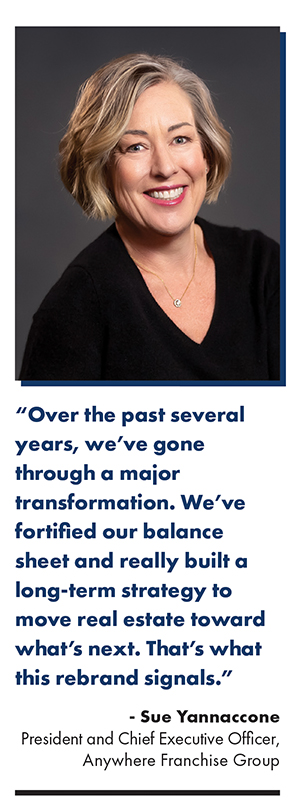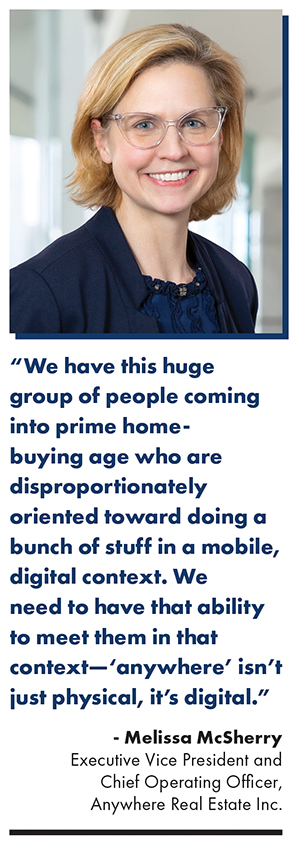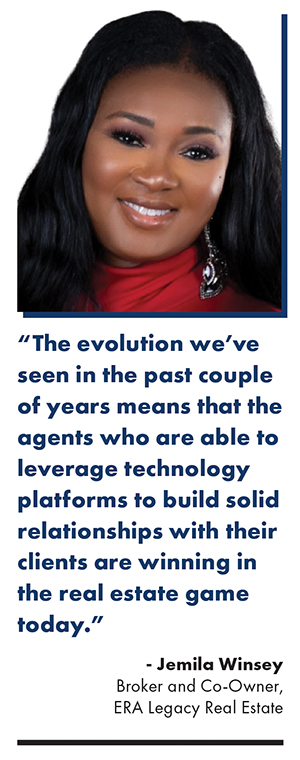 Let’s face it. All bets are off. When the pandemic descended upon us, life as we knew it changed in so many ways, from the minute to the monumental. And from all accounts, the arc is still bending.
Let’s face it. All bets are off. When the pandemic descended upon us, life as we knew it changed in so many ways, from the minute to the monumental. And from all accounts, the arc is still bending.
During these transformational times, everyone has had to make a choice. Remain as-is in the hopes that things go back to “normal”—or change. Transform.
Enter Anywhere Real Estate.
The philosophy of ‘Anywhere’
Announcing a bold rebrand this past May during its Investor Day, Realogy made what it viewed as a critical course correction to accurately reflect what real estate has become…and is becoming. The dramatic name change to Anywhere Real Estate Inc. (referred to as ‘Anywhere’) is intended to speak to both real estate professionals, as well as the consumers they serve; to meet everyone—and anyone—where they are in the real estate journey…anywhere that happens to be.
“Over the past several years, we’ve gone through a major transformation,” says Sue Yannaccone, president and CEO of the Anywhere brand’s franchise group (formerly Realogy Franchise Group). “We’ve fortified our balance sheet and really built a long-term strategy to move real estate toward what’s next. That’s what this rebrand signals. It’s better representation of our mission and our go-forward vision.”
While linguistically simple, the Anywhere rebrand is actually quite dimensional.
For starters, it speaks to the importance of place—both literally and figuratively—in today’s real estate transaction. “It’s about meeting the consumer literally anywhere on their buying and selling journey—search, mortgage, title and more,” Yannaccone explains. “We can empower them anywhere in the process. And in an increasingly mobile world, it speaks to conducting business from anywhere. We meet them anywhere during the transaction but also anywhere from an enablement perspective, whether they want to be fully digital or less so.”
Meeting consumers anywhere includes person-to-person to whatever degree they demand, Yannaccone stresses. “What shouldn’t be lost here is the power of the incredible base of agents we have,” she says. “There is work in real estate that will always need that human.”
While the name is new, the foundational journey behind Anywhere has been happening for several years. “We had already begun activating some integrated, tech-forward and simplified experiences for the homebuyer and seller, keeping the agent at the heart of that transaction,” Yannaccone explains. The company’s integrated title services, mortgage joint ventures, RealSure and RealVitalize products, and the newly launched HomePlace app are just a few proof points of the Anywhere journey thus far. As Yannaccone puts it, “We’ve been on it, and now we’re going further.”
While the Anywhere rebrand was only days old at press time, first reactions were positive. “The best brands evolve themselves to meet the markets they’re in,” says Yannaccone. “This signals an evolution and the next iteration.”

Meeting the call to transform
The best brands do indeed evolve over time, answering the call to become more relevant and more in sync with the constituents they serve. The Anywhere rebrand, however, arrives with a sense of urgency, hitting the industry at a critical inflection point where evolution is necessary in order for any real estate company or professional to survive.
“We’ve been talking about change in our industry and changing consumer expectations for decades,” says Yannaccone. “I think what’s changed now is the consumer themselves, and that is requiring us to work and think differently. The consumer demands that we iterate and remove the friction and de-risk the transaction to the extent that we can.”
Anywhere is certainly answering this call with products and offerings designed to eliminate friction and risk for the consumer during a real estate transaction; however, consumers must leverage an agent to do so.
According to Anywhere Chief Operating Officer Melissa McSherry, the brand speaks to consumers, but via the agent. “The consumer focus complements the strength we already have in supporting agents with a set of capabilities that reimagines the experience of buying and selling a house,” she says. “There will be some consumers who want just a little bit of innovation and a little bit of friction coming out. There will be other consumers who will have a totally reimagined version—totally digital, push a button. We can meet consumers anywhere they are on that innovation spectrum.”
Jemila Winsey, broker and co-owner of ERA Legacy Real Estate in Houston, Texas, has witnessed the consumer demand for tech innovation first-hand.
“The pandemic fast-tracked how consumers behave as it relates to the real estate transaction,” explains Winsey. “Our consumers are now very comfortable with technology and almost all start their real estate journey online. They also have access to a wealth of information on the process before picking up the phone to call a REALTOR®. Our market is extremely fast-paced, and the expectation of the consumer is to receive information in real-time. We need to be able to pivot and have access to the right tools and platforms to meet this demand.”
The Anywhere rebrand ultimately speaks to the entire real estate ecosystem, says Anywhere Chief People Officer Tanya Reu-Narvaez. “It really brings our businesses and brands together under an umbrella to meet our consumers anywhere they are in the real estate transaction,” she says. “It also allows us to meet our employees anywhere they are on their career trajectory. We’re focusing on integration to meet consumers, agents, brokers and employees anywhere they are.”

The changing face of real estate
Baked into the philosophy of the Anywhere brand is the concept of “anyone,” aimed directly at better addressing the changing demographics of today’s and tomorrow’s homeowners. The rebranding fully acknowledges that the homeowners of tomorrow will be more diverse in every way.
“The face of the industry is absolutely changing, being led by the changing face of the consumer of today and tomorrow—from a diversity perspective, from a demographic perspective—and we have to be in it and truly understand it,” explains Yannaccone.
For starters, the largest cohort of millennials to date is set to turn 35 over the next five years—a ripe age for homeownership. According to Yannaccone, such generational changes are going to require real estate professionals to do business differently. “Think about the way a millennial consumes—they’re digital natives, they expect everything to be frictionless and online, and they want to be offline when they want to be offline,” she explains. “So it’s about meeting their needs wherever they are.”
One place millennials tend to regularly be is on their mobile devices, a mechanism they employ for “doing just about everything,” says McSherry. “We have this huge group of people coming into prime home-buying age who are disproportionately oriented toward doing a bunch of stuff in a mobile, digital context,” she explains. “We need to have that ability to meet them in that context—’anywhere’ isn’t just physical, it’s digital.”
Throughout the millennial cohort and well beyond, the face of real estate is also changing from a racial, gender and sexual-orientation perspective. That’s why, for Yannaccone, Diversity, Equity and Inclusion (DEI) efforts must begin at the company level and go well beyond “checking a box” in order to have a tangible impact. At press time, for example, Anywhere had just held its third annual Day of Understanding with a focus on allyship. The event was hosted by the firm’s Employee Resource Groups (ERGs), composed of and empowering underrepresented demographics to challenge the company to think differently. This year’s keynote speaker, DEI expert Willie Jackson, encapsulated Anywhere’s approach to diversity when he expressed that you don’t need to be an expert in every element of DEI to make an impact, but that each of us still needs to push for progress.

Anywhere has done just that and has several proof points to back it up. Through the firm’s Inclusive Ownership Program, for example, the company has witnessed a 72% increase in diverse GCI across its franchise brands. Forty-five percent of attendees in the Anywhere Ascend program, designed to cultivate the next generation of real estate leaders, are now running their companies. And the two programs serendipitously weave together to create an even greater impact: 19 of the companies that came through the Inclusive Ownership program began their journey via Ascend. Anywhere has also taken its DEI advocacy beyond its own walls, white-labeling its Fair Housing Training for industry-wide use.
In her role, Reu-Narvaez heads up talent acquisition and management, as well as culture and DEI for all brands under the Anywhere umbrella.
“You hear a lot about DEI being a priority now, and that statement is frustrating, but I’ll take it,” she laughs. “Today is the two-year anniversary of George Floyd (at press time), and I think a lot of companies realize we have much more to do. From our standpoint, this has been a priority of ours for decades.”
According to Reu-Narvaez, the Inclusive Ownership Program exemplifies that prioritization by providing an action plan for diversifying the franchise-owner base.
“We want to see the sustained success of our diverse owners,” she explains. “We extended it to all brands in 2021, and we’re up to 50 companies that have come to us through this program. We just launched a six-month development program that helps them with their onboarding and setting up their company for success.”
Reu-Narvaez is also proud of the Anywhere company’s representation in terms of gender. “We’re certainly an industry that is heavily represented by women at the agent level, but at the broker/owner level, there’s much less representation,” she explains. “We are very proud of our gender representation in leadership roles. There’s a call to action there for the industry, and we’re happy to get right behind it.”
The DEI efforts made at the corporate level have not gone unnoticed. They serve as inspiration that travels far and wide among the many Anywhere brands. Winsey, for example, has responded to the call in every way. Her company is a member of NAHREP and AREAA, and she personally served on the board of the Houston Real Estate Black Association and the Houston chapter of the National Association of Real Estate Brokers. While there, she spearheaded the first Top 20 Black Real Estate Awards in the country.
“This is something we are very intentional about,” says Winsey. “We run a very diverse brokerage with 20 countries and languages represented. Our leadership team is held accountable to ensure that we remain diverse. Additionally, we encourage our agents to do the same by looking at their client pool and proactively seeking opportunities to diversify. We also have an inclusive culture and transparent conversations relating to diversity and inclusion. We are not shy about having an open dialogue.”
The type of DEI leadership that Winsey embodies is imperative toward solving for the inequalities in homeownership that currently exist, says Yannaccone. “The 30% disparity between Black and White homeownership is larger now than it was in 1968, when it was legal to discriminate,” she says. “According to the Human Rights Campaign, the LGBTQ+ community is 73% more likely to be denied a loan even though there’s no proof of higher likelihood to default. If you have greater representation in your leadership ranks, you’re going to make decisions that are influenced by a more diverse thought leadership.”
Anywhere has made a host of extensive efforts aimed at increasing DEI, including through decades-long partnerships with NAHREP, AREAA, NAREB, Women Up, What Moves Her, Empowering Latinas and the Real Estate Alliance, to name a few. As Reu-Narvaez says, “We work in a very integrated manner to accelerate our efforts.” And those efforts have been recognized. In its former iteration as Realogy, the firm was named a LinkedIn Top Company as well as a Top Employer for Diversity by Forbes.
While expanding DEI efforts in this manner is simply the right thing to do, Yannaccone says it goes beyond a moral imperative to a business imperative.
“Companies in the top quartile for racial and ethnic diversity are 35% more likely to have financial returns above the industry mediums, according to McKinsey research,” she explains. “This is tangible. We need to stop considering our industry to be so unbelievably unique that those proof points don’t transfer. When you look at research around the value of gender diversity and racial diversity, it’s too significant and too consistent to ignore. Diversity of thought allows you to serve a broader population of consumers, and that elevates the company’s returns.”

Reu-Narvaez agrees. “We firmly believe that inclusion, as the anchor for our culture, invites new thinking and diverse perspectives into the conversation, and influences the overall culture of the organization,” she says. “And that requires systemic changes.”
Diversity starts at home
Creating that systemic change has been something Reu-Narvaez has been working toward for some time, ever since she joined Realogy 20 years ago.
“When you look at real estate, we have been and still are a very underrepresented industry,” she says. “Look at the homebuyers and sellers of today and then those who represent the industry—there’s a major disconnect. We made it our mission to change that trajectory 20 years ago. That’s why DEI has been part of our strategy from a growth perspective—because it is essential.”
Seeking out diverse talent means going beyond race and gender to embrace a diversity of experience as well, bucking the standard industry practice of recruiting from within. “We believe that diverse experience from other industries, whether someone has a technology mindset or a luxury market mindset, is really important in strengthening not only the culture but also the capability of the teams across our organization. When you do that, it opens up a greater, diverse population.”
Attracting diverse talent also means breaking down real estate’s barriers to entry by providing sufficient mentorship at every level, and bridging the industry’s inherent financial challenges.
“We always say that there are no barriers, but there are,” Yannaccone explains. “You have no paycheck. You have no health insurance. We have to have a pathway and make it an attractive and viable opportunity and slow down the churn.”
One way the company has reduced barriers to attract and maintain a more diverse talent pool is by transitioning to a hybrid work model. Developed in the wake of the pandemic, the former three-floor office building that served as Realogy headquarters in Madison, New Jersey, has become a state-of-the-art, one-floor open office space known as the “Hub.” This adds another dimension to the company’s rebrand as certain employees can now work from “anywhere.”
Reu-Narvaez describes the Hub as a “plug-and-play, hoteling-type concept where we can facilitate open collaboration for teams when and where they see fit. This allows us to keep the culture of connectivity alive.”

Photo credit: NYSE
The hybrid work model speaks to today’s need for flexibility, which is part and parcel of the Anywhere concept. Reu-Narvaez sees this as a permanent shift. “Our lives have become this integrated world of personal, work and everything in between,” she says. “I don’t see that going back to the compartmentalized way it was in the past. I think it really aligns with the fluidity and flexibility we’re experiencing as humans and as professionals.”
McSherry sees the hybrid work environment as an opportunity to attract more diverse talent. “With the flexibility we’re offering, there’s an aspect of ‘anywhere’ from an employment standpoint,” she says. “We’re supporting employees anywhere, which significantly broadens for whom anywhere is an attractive employment destination.”
Reu-Narvaez agrees. “There certainly are roles where employees have to be onsite to support agents, but we’ve gone from 5% being remote pre-covid to about 60%,” she says. “Think about the opportunity that presents on the talent-attraction front—it creates a much broader population of talent we can tap into.”
Of course, like every company that has moved to a remote or hybrid model, maintaining company culture can become challenging—but nothing Reu-Narvaez isn’t ready to tackle.
“Covid has really allowed us to break down some barriers and cross borders,” she says. “We have six different brands and four different companies, and we’ve seen more cross-collaboration and cross-teaming than we’ve ever seen before, and that’s really enabling our culture to move to what’s next.”
Pandemic times also forged a stronger connection between agents and their brands, particularly in terms of virtual education. “These levels of engagement have been so significant,” says Reu-Narvaez. “And those are silver linings that we’re carrying forward.”
Making it all possible: Technology
Whether it’s working remotely or creating a more frictionless real estate transaction, the engine enabling Anywhere to meet consumers, brokers, agents and employees anywhere they are is technology.
“We are harnessing the power of our unique advantages,” says McSherry. “We have world-class brands and an amazing agent network, and via technology and data scale, we can create better experiences for consumers.”

From MoxiWorks and its open tech-architecture platform to data programs like Affiliate Insights to consumer programs like RealSure and RealVitalize, McSherry explains that the company’s advancements in technology are designed to harness the future of real estate.
“You have to respond to the perspectives and expectations of your customer base,” she says. “Many years ago, so much of this work was done in an office, by hand, with paper—and as people become more comfortable doing these things in a digital context, technology has become very scale driven. The willingness of consumers to engage in a digital way in the home search and transaction process necessitates using technology to make this a more frictionless and efficient experience.”
To that end, the development of agent-focused technology has been a critical strategy for the company. Agent-focused technology, that is, that allows them to better serve the consumer.
“I view the tech investments we’re making as fundamentally an enabler,” explains McSherry. “They’re an enabler of agents being able to spend more time with consumers, which is a better way to meet consumers where they are and, at the same time, take friction, stress and anxiety out of the process. The more the technology frees the agent to do the things only people can do, the better job the agent can do in meeting the needs of the consumer.”

Winsey is proof positive of this fact. “The evolution we’ve seen in the past couple of years means that the agents who are able to leverage technology platforms to build solid relationships with their clients are winning in the real estate game today,” she says.
The Anywhere tech strategy, therefore, means being able to meet consumers truly anywhere they are, whether it’s the kitchen table or a DocuSign file. As McSherry puts it, “We will meet consumers anywhere in the physical and digital divide. For the 35 and under crowd, ‘we’ve got an app for that.’ For others, we enable the agent.”
McSherry points to the HomePlace app as the perfect example, granting consumers mobile-device access to all the documents associated with their transaction, from the home inspection report to the closing docs.
But whether it’s HomePlace or another tech tool, McSherry emphasizes that, “There’s no app that will be able to do the things people do.”
Winsey can testify to this fact. “The agent is no longer a salesperson,” she says. “They are problem solvers, subject-matter experts and strategic consultants. Consumers rely on the agent for more than just presenting a list of homes for sale or your run-of-the-mill listing presentation; they are looking to fill in the gaps and get answers to questions they were not able to find online.”
Yannaccone wholeheartedly agrees.
“The transaction is more complex than ever,” she says. “Consumers have to navigate a significant number of products and tech services. Plus the complexity of navigating the financial end of the transaction—that requires a dynamic professional who can offer individual guidance.”
But not just any professional will do, she adds. It must be an agent who has the ability to guide a consumer through the transaction in the most frictionless way.
“When we look back with the lens of ‘how in the world did we ever do business that way?’ that does not mean we will no longer need an agent,” Yannaccone explains. “It is empowering the agent to have the resources so that they can guide their consumer to make the best decision in the most important financial transaction they’re going to make. There are things an agent can do that no technology is going to replace. But the agent that fails to embrace the tools that make it more seamless…that agent’s going to be replaced. Being connected to a company that is going to provide those resources to consumers and that agent is going to be invaluable.”
Ready for the future of homeownership
As the housing market heads toward further uncertainty in the face of rising interest rates, continued affordability concerns and world events at large, being able to overcome yet-to-be-revealed challenges will be more important than ever. But Yannaccone reminds us that it’s not all bad.
“We’re more optimistic about the medium-term outlook for the industry than some of the headlines we’ve seen,” she says. “Fundamentally, there is steady, strong demand for housing. The demographic and cultural shifts indicate that demand will continue. Rising interest rates will put pressure on first-time homeowners for sure, and we need more supply. So that will put pressure on the immediate to midterm.”
Throughout these ups and downs of the current and future market, and as the face of homeownership continues to change, there will be one constant, says Winsey: relationship.
“Real estate is still very much a relationship business,” she says. “The difference is that now, we have the opportunity to elevate the client experience with the tools we have at our disposal. We now have the opportunity to automate many of the historically inefficient parts of our business so we can focus on what really matters, which is taking care of our clients. I believe agents who work with brokerages or teams and are forward-thinking enough to provide this type of ecosystem are the agents of the future.”
Anywhere plans to be just that ecosystem, continuing to work backwards from the needs of agents, brokers and consumers, says McSherry. “The company is very different than it was five years ago,” she says. “There’s an enormous amount of work that’s been done over the past five years in terms of the balance sheet and in terms of tech investment. If, across all constituencies, people said, ‘I get what that Anywhere company is,’ I think that would be a huge win.”
And on the path forward, Anywhere will continue to prioritize diversity, and work toward creating a residential real estate industry that reflects and serves the changing face of homeownership.
“I’m glad to see that many of the companies in our industry are stepping up because it’s very important—and it’s needed,” says Reu-Narvaez. “We have a lot of work to do together as an industry to make the right changes and have the right impact.”
Yannaccone is more than ready for the challenge.
“Today, especially, we want to leverage our critical mass and who we are in the industry to drive the appropriate social change so that we can accelerate some of these efforts going forward,” she says. “We recognize our role in corporate America.”
For more information, visit https://www.anywhere.re/.












